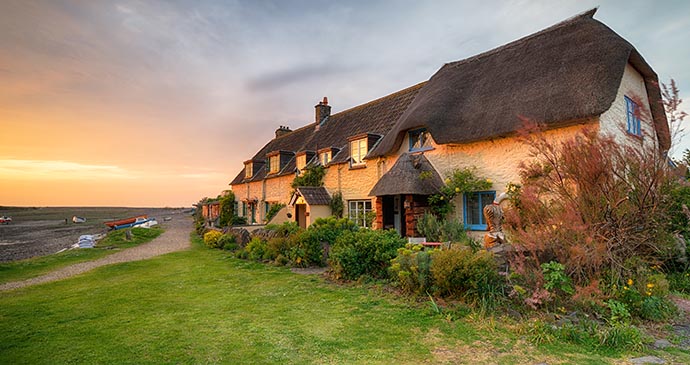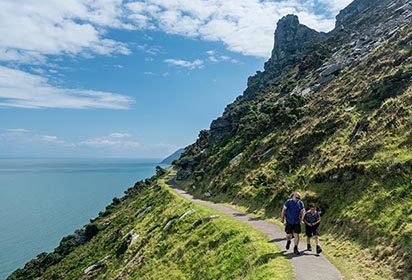Written by Janice Booth
 Sunset over Porlock Weir © Helen Hotson, Shutterstock
Sunset over Porlock Weir © Helen Hotson, Shutterstock
‘Vessel in distress,’ reported a message telegraphed from Porlock Weir to Lynmouth Post Office. A force-eight gale had raged all day in the Bristol Channel and by evening Lynmouth’s lower streets were awash. Further along the coast, off Gore point near Porlock, the three-masted barque Forrest Hall was tossing helplessly, held only by her anchors; she’d been on tow from Bristol to Liverpool when her tug suffered damage and had to abandon her to the storm.
The nearest lifeboat, at Watchet, could not launch in the heavy seas, and the telegram requested assistance from the Lynmouth lifeboat. This was in January 1899, when lifeboats were rowed manually and ships could go to their graves in the time that it took for help to arrive. A maroon was fired to summon the lifeboat’s crew. The doors of the lifeboat shed were opened but it was clear that the boat – the 3½-ton Louisa – had no hope of launching into the churning sea. It was decided to haul her the 13 miles overland to Porlock Weir, and to attempt a launch from there.
Horses were brought – with extra ones for the steep two-mile climb up Countisbury Hill – and ropes were attached to the trailer that bore the lifeboat. Torches and flares were lit. From every home, heedless of weather and darkness, villagers came to help with the preparations, and within an hour of the telegram’s arrival all was set. It seemed barely possible, but everyone agreed: ‘We’ll try’. On her trailer, the Louisa weighed ten tons. Slowly and laboriously, men and horses together hauled her up the hill. At the summit some men, exhausted, returned home; 20 remained to see her across the moor in the teeth of the storm.
Rain and wind extinguished the torches, which had to be continually re-lit. Ropes were slippery and hard to grip. At one point a wheel came off; the boat had to be lifted manually so it could be replaced. One lane was too narrow for the trailer, so the Louisa was lowered on to wooden skids and dragged through while the trailer took a longer route; when they met again the boat was heaved back up. A small group went ahead with picks and spades to widen the narrow lane at Culbone.
Next came the notorious Porlock Hill, a dizzily steep descent needing all available man- and horse-power to prevent the whole thing from hurtling downwards to destruction. At the bottom a garden wall had to be demolished – the lady householder, who had never seen a lifeboat before, enthusiastically joined in the work. Eventually, ten hours after leaving Lynmouth, the Louisa was dragged on to the beach at Porlock Weir.
Refusing to rest, the 13 lifeboatmen clambered aboard as helpers pushed the boat into the battering waves. After rowing for about an hour they located the Forrest Hall, whose anchors had dragged but held firm. To evacuate her frightened 19-man crew in so wild a sea would have risked lives; she seemed in no immediate danger so the Louisa simply stood by. As day broke the barque was drifting alarmingly close to shore but her tug returned in the nick of time. Some of the lifeboat crew clambered aboard and attached her tow-lines; the Louisa then accompanied her – still pounded by the storm – as she was towed to a place of safety on the Welsh coast. There the men had a meal and a hearty sleep before returning to Lynmouth – and a heroes’ welcome – the following day.
No human lives were lost but, sadly, four of the horses that had hauled the boat died from their exertions. The cost of the rescue, including repairs to damaged roads and gardens, was £118.17, of which the Forrest Hall’s owners paid £75. Members of the Louisa’s crew each received £5 from local funds and a silver watch from a wealthy local resident. You can find more details of this extraordinary story of courage and determination in the exhibition at Lynmouth and the little museum in Porlock Weir where there’s the saying: ‘If it’s not us, then it’s nobody. And it’s never not nobody, not in the lifeboat service.’
Want to learn more about North Devon & Exmoor? Check out the latest guide to the area.

